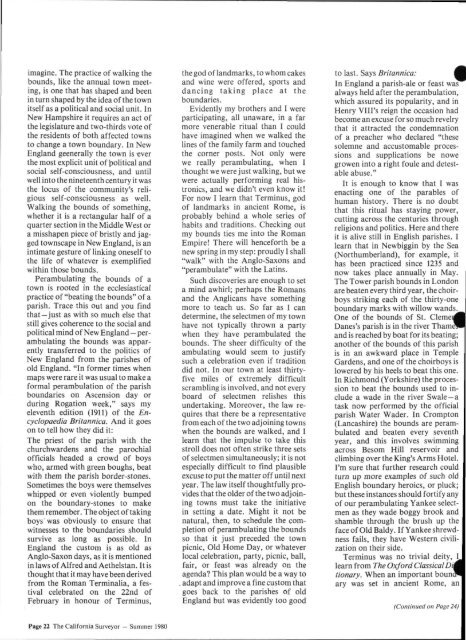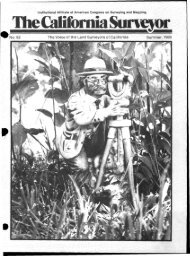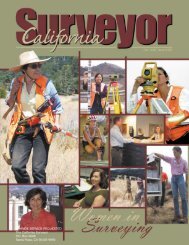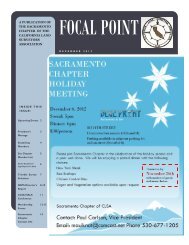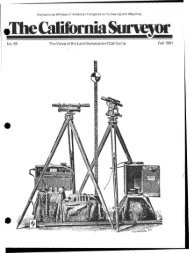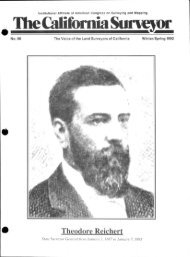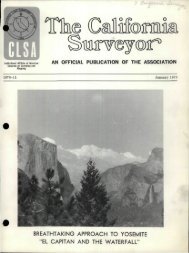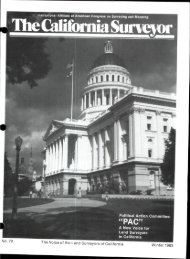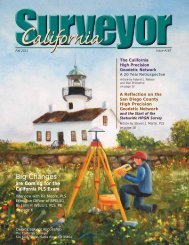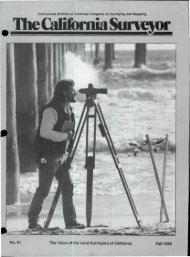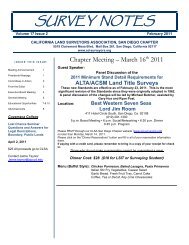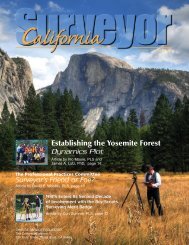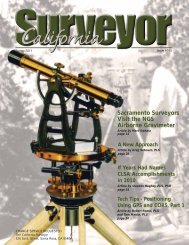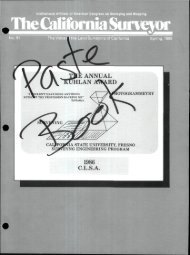Institutional Affiliate of American Congress on Surveying - CLSA
Institutional Affiliate of American Congress on Surveying - CLSA
Institutional Affiliate of American Congress on Surveying - CLSA
You also want an ePaper? Increase the reach of your titles
YUMPU automatically turns print PDFs into web optimized ePapers that Google loves.
imagine. The practice <str<strong>on</strong>g>of</str<strong>on</strong>g> walking the<br />
bounds, like the annual town meeting,<br />
is <strong>on</strong>e that has shaped and been<br />
in turn shaped by the idea <str<strong>on</strong>g>of</str<strong>on</strong>g> the town<br />
itself as a poUtical and social unit. In<br />
New Hampshire it requires an act <str<strong>on</strong>g>of</str<strong>on</strong>g><br />
the legislature and two-thirds vote <str<strong>on</strong>g>of</str<strong>on</strong>g><br />
the residents <str<strong>on</strong>g>of</str<strong>on</strong>g> both affected towns<br />
to change a town boundary. In New<br />
England geenerally the town is -ever<br />
the most expUcit unit <str<strong>on</strong>g>of</str<strong>on</strong>g> political and<br />
social self-c<strong>on</strong>sciousness, and until<br />
well into the nineteenth century it was<br />
the locus <str<strong>on</strong>g>of</str<strong>on</strong>g> the community's religious<br />
self-c<strong>on</strong>sciousness as well.<br />
Walking the bounds <str<strong>on</strong>g>of</str<strong>on</strong>g> something,<br />
whether it is a rectangular half <str<strong>on</strong>g>of</str<strong>on</strong>g> a<br />
quarter secti<strong>on</strong> in the Middle West or<br />
a misshapen piece <str<strong>on</strong>g>of</str<strong>on</strong>g> bristly and jagged<br />
townscape in New England, is an<br />
intimate gesture <str<strong>on</strong>g>of</str<strong>on</strong>g> linking <strong>on</strong>eself to<br />
the life <str<strong>on</strong>g>of</str<strong>on</strong>g> whatever is exemplified<br />
within those bounds.<br />
Perambulating the bounds <str<strong>on</strong>g>of</str<strong>on</strong>g> a<br />
town is rooted in the ecclesiastical<br />
practice <str<strong>on</strong>g>of</str<strong>on</strong>g> "beating the bounds" <str<strong>on</strong>g>of</str<strong>on</strong>g> a<br />
parish. Trace this out and you find<br />
that—just as with so much else that<br />
still gives coherence to the social and<br />
political mind <str<strong>on</strong>g>of</str<strong>on</strong>g> New England — perambulating<br />
the bounds was apparently<br />
transferred to the politics <str<strong>on</strong>g>of</str<strong>on</strong>g><br />
New England from the parishes <str<strong>on</strong>g>of</str<strong>on</strong>g><br />
old England. "In former times when<br />
maps were rare it was usual to make a<br />
formal perambulati<strong>on</strong> <str<strong>on</strong>g>of</str<strong>on</strong>g> the parish<br />
boundaries <strong>on</strong> Ascensi<strong>on</strong> day or<br />
during Rogati<strong>on</strong> week," says my<br />
eleventh editi<strong>on</strong> (1911) <str<strong>on</strong>g>of</str<strong>on</strong>g> the Encyclopaedia<br />
Britannica, And it goes<br />
<strong>on</strong> to tell how they did it:<br />
The priest <str<strong>on</strong>g>of</str<strong>on</strong>g> the parish with the<br />
churchwardens and the parochial<br />
<str<strong>on</strong>g>of</str<strong>on</strong>g>ficials headed a crowd <str<strong>on</strong>g>of</str<strong>on</strong>g> boys<br />
who, armed with green boughs, beat<br />
with them the parish border-st<strong>on</strong>es.<br />
Sometimes the boys were themselves<br />
whipped or even violently bumped<br />
<strong>on</strong> the boundary-st<strong>on</strong>es to make<br />
them remember. The object <str<strong>on</strong>g>of</str<strong>on</strong>g> taking<br />
boys was obviously to ensure that<br />
witnesses to the boundaries should<br />
survive as l<strong>on</strong>g as possible. In<br />
England the custom is as old as<br />
Anglo-Sax<strong>on</strong> days, as it is menti<strong>on</strong>ed<br />
in laws <str<strong>on</strong>g>of</str<strong>on</strong>g> Alfred and Aethelstan. It is<br />
thought that it may have been derived<br />
from the Roman Terminalia, a festival<br />
celebrated <strong>on</strong> the 22nd <str<strong>on</strong>g>of</str<strong>on</strong>g><br />
February in h<strong>on</strong>our <str<strong>on</strong>g>of</str<strong>on</strong>g> Terminus,<br />
the god <str<strong>on</strong>g>of</str<strong>on</strong>g> landmarks, to whom cakes<br />
and wine were <str<strong>on</strong>g>of</str<strong>on</strong>g>fered, sports and<br />
dancing taking place at the<br />
boundaries.<br />
Evidently my brothers and I were<br />
participating, all unaware, in a far<br />
more venerable ritual than I could<br />
have imagined when we walked the<br />
lines <str<strong>on</strong>g>of</str<strong>on</strong>g> the family farm and touched<br />
the corner posts. Not <strong>on</strong>ly were<br />
we really perambulating, when I<br />
thought we were just walking, but we<br />
were actually performing real histr<strong>on</strong>ics,<br />
and we didn't even know it!<br />
For now I learn that Terminus, god<br />
<str<strong>on</strong>g>of</str<strong>on</strong>g> landmarks in ancient Rome, is<br />
probably behind a whole series <str<strong>on</strong>g>of</str<strong>on</strong>g><br />
habits and traditi<strong>on</strong>s. Checking out<br />
my bounds ties me into the Roman<br />
Empire! There will henceforth be a<br />
new spring in my step: proudly I shall<br />
"walk" with the Anglo-Sax<strong>on</strong>s and<br />
"perambulate" with the Latins.<br />
Such discoveries are enough to set<br />
a mind awhirl; perhaps the Romans<br />
and the Anglicans have something<br />
more to teach us. So far as I can<br />
determine, the selectmen <str<strong>on</strong>g>of</str<strong>on</strong>g> my town<br />
have not typically thrown a party<br />
when they have perambulated the<br />
bounds. The sheer difficulty <str<strong>on</strong>g>of</str<strong>on</strong>g> the<br />
ambulating would seem to justify<br />
such a celebrati<strong>on</strong> even if traditi<strong>on</strong><br />
did not. In our town at least thirtyfive<br />
miles <str<strong>on</strong>g>of</str<strong>on</strong>g> extremely difficult<br />
scrambling is involved, and not every<br />
board <str<strong>on</strong>g>of</str<strong>on</strong>g> selectmen relishes this<br />
undertaking. Moreover, the law requires<br />
that there be a representative<br />
from each <str<strong>on</strong>g>of</str<strong>on</strong>g> the two adjoining towns<br />
when the bounds are walked, and I<br />
learn that the impulse to take this<br />
stroll does not <str<strong>on</strong>g>of</str<strong>on</strong>g>ten strike three sets<br />
<str<strong>on</strong>g>of</str<strong>on</strong>g> selectmen simultaneously; it is not<br />
especially difficult to find plausible<br />
excuse to put the matter <str<strong>on</strong>g>of</str<strong>on</strong>g>f until next<br />
year. The law itself thoughtfully provides<br />
that the older <str<strong>on</strong>g>of</str<strong>on</strong>g> the two adjoining<br />
towns must take the initiative<br />
in setting a date. Might it not be<br />
natural, then, to schedule the completi<strong>on</strong><br />
<str<strong>on</strong>g>of</str<strong>on</strong>g> perambulating the bounds<br />
so that it just preceded the town<br />
picnic, Old Home Day, or whatever<br />
local celebrati<strong>on</strong>, party, picnic, ball,<br />
fair, or feast was already <strong>on</strong> the<br />
agenda? This plan would be a way to<br />
. adapt and improve a fine custom that<br />
goes back to the parishes <str<strong>on</strong>g>of</str<strong>on</strong>g> old<br />
England but was evidently too good<br />
to last. Says Britannica: ^|<br />
In England a parish-ale or feast was<br />
always held after the perambulati<strong>on</strong>,<br />
which assured its popularity, and in<br />
Henry VIII's reign the occasi<strong>on</strong> had<br />
become an excuse for so much revelry<br />
that it attracted the c<strong>on</strong>demnati<strong>on</strong><br />
<str<strong>on</strong>g>of</str<strong>on</strong>g> a preacher who declared "these<br />
solemne and accustomable processi<strong>on</strong>s<br />
and supplicati<strong>on</strong>s be nowe<br />
growen into a right foule and detestable<br />
abuse."<br />
It is enough to know that I was<br />
enacting <strong>on</strong>e <str<strong>on</strong>g>of</str<strong>on</strong>g> the parables <str<strong>on</strong>g>of</str<strong>on</strong>g><br />
human history. There is no doubt<br />
that this ritual has staying power,<br />
cutting across the centuries through<br />
religi<strong>on</strong>s and politics. Here and there<br />
it is alive still in English parishes. I<br />
learn that in Newbiggin by the Sea<br />
(Northumberland), for example, it<br />
has been practiced since 1235 and<br />
now takes place annually in May.<br />
The Tower parish bounds in L<strong>on</strong>d<strong>on</strong><br />
are beaten every third year, the choirboys<br />
striking each <str<strong>on</strong>g>of</str<strong>on</strong>g> the thirty-<strong>on</strong>e<br />
boundary marks with willow wands._,<br />
One <str<strong>on</strong>g>of</str<strong>on</strong>g> the bounds <str<strong>on</strong>g>of</str<strong>on</strong>g> St. Clemei^^<br />
Danes's parish is in the river Tham^B<br />
and is reached by boat for its beating;<br />
another <str<strong>on</strong>g>of</str<strong>on</strong>g> the bounds <str<strong>on</strong>g>of</str<strong>on</strong>g> this parish<br />
is in an awkward place in Temple<br />
Gardens, and <strong>on</strong>e <str<strong>on</strong>g>of</str<strong>on</strong>g> the choirboys is<br />
lowered by his heels to beat this <strong>on</strong>e.<br />
In Richm<strong>on</strong>d (Yorkshire) the processi<strong>on</strong><br />
to beat the bounds used to include<br />
a wade in the river Swale —a<br />
task now performed by the <str<strong>on</strong>g>of</str<strong>on</strong>g>ficial<br />
parish Water Wader. In Crompt<strong>on</strong><br />
(Lancashire) the bounds are perambulated<br />
and beaten every seventh<br />
year, and this involves swimming<br />
across Besom Hill reservoir and<br />
climbing over the King's Arms Hotel.<br />
I'm sure that further research could<br />
turn up more examples <str<strong>on</strong>g>of</str<strong>on</strong>g> such old<br />
English boundary heroics, or pluck;<br />
but these instances should fortify any<br />
<str<strong>on</strong>g>of</str<strong>on</strong>g> our perambulating Yankee selectmen<br />
as they wade boggy brook and<br />
shamble through the brush up the<br />
face<str<strong>on</strong>g>of</str<strong>on</strong>g> OldBaldy. If Yankee shrewdness<br />
fails, they have Western civilizati<strong>on</strong><br />
<strong>on</strong> their side.<br />
Terminus was no trivial deity, I<br />
learn from The Oxford ClassicalD^^<br />
ti<strong>on</strong>ary. When an important bouncP<br />
ary was set in ancient Rome, an<br />
(C<strong>on</strong>tinued <strong>on</strong> Page 24)<br />
Page 22 The California Surveyor — Summer 1980


